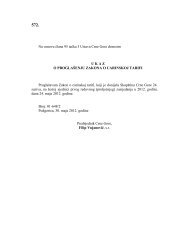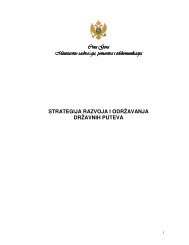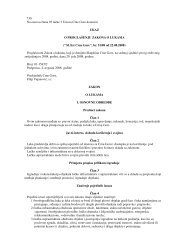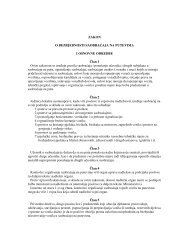pravilnik o zvanjima i ovlaÅ¡Äenjima o osposobljenosti pomoraca
pravilnik o zvanjima i ovlaÅ¡Äenjima o osposobljenosti pomoraca
pravilnik o zvanjima i ovlaÅ¡Äenjima o osposobljenosti pomoraca
You also want an ePaper? Increase the reach of your titles
YUMPU automatically turns print PDFs into web optimized ePapers that Google loves.
193<br />
– fire pump and emergency systems<br />
– bilge pumps<br />
– lifeboats, engines, pumps<br />
– lifesaving equipment<br />
– emergency steering gear<br />
UNFINISHED TASKS**<br />
SERIAL<br />
NUMBER OF<br />
THE TASK<br />
DATE<br />
TASK DONE<br />
AUTHORISED<br />
PERSON<br />
SIGNATURE<br />
REMARKS<br />
** This is the table for the tasks which have not been passed during apprentice service onboard. Those tasks have to be passed<br />
during consultations before exam.<br />
Logbook contains two pages mentioned above.<br />
ENGINEER’S RESPONSIBILITY DURING WATCHKEEPING<br />
Chief engineer is responsible for maintenance and work of all installation including electrical equipment as well.<br />
He gives orders for:<br />
– work of all installation and electrical distribution<br />
– maintenance of installation and equipment, periodical and planed inspections;<br />
– safe work<br />
In addition he will give special orders depending of the situation.<br />
Such orders must be well known and accepted by engineers on watch<br />
Under command of the chief engineer, engineer on duty is responsible for working control and testings of all installation and<br />
equipment during the watch. He is representative of chief engineer and he cares about efficiency and maintenance of the installation<br />
and about safety of the ship. He is responsible for the engineroom, beside chief engineer until he releases him from duty.<br />
WATCHKEEPING IN THE NAVIGATION<br />
Takeover of the watch<br />
Engineer on duty must not give over duty to another engineer if this one in not capable to takeover the watch, in that case he must<br />
inform chief engineer.<br />
Engineer who is taking over the watch must check working stability of the installation. He must have control of main engine, auxiliary<br />
installations and equipment. He must be satisfied with work of engineroom stuff, and must give them orders what to do during the<br />
watch. He must be sure that each member of the watch is well informed with his duties, each member of the have to;<br />
– know how to use internal communication system<br />
– know all exits from engineroom<br />
– know alarm system and difference between alarms, especially co2,<br />
– know position and use of firefighting equipment in the engineroom<br />
– avoid all possibilities of sea pollution.<br />
On the beginning of the watch he must accept operational parameters and condition of all installation.<br />
Engineer who taking over the watch must not do so, until he checks state in the logbook and compares it with virtual state.<br />
He must check:<br />
– usual orders of the chief engineer considering ship and installation<br />
– water level in all tanks (bilges, slops, sewage, potable water, etc)<br />
– sewage system, (working condition and instruments)<br />
– work of boilers (automatic flame control, feed water control, fuel delivery etc.)<br />
– possible warning about bad weather, ice or usage of the sea for potable water producing.<br />
– special working condition caused by equipment failure or condition of the ship<br />
– report all measures agreed<br />
– firefighting system<br />
Engineer on duty must keep under control main engine and auxiliary installation until his replacement.<br />
He must regularly make a tour around installation and steering gear room as well to locate possible failure, make some adjustments<br />
etc.<br />
Periodical control must confirm that:<br />
– main engine and auxiliary engine control work properly







